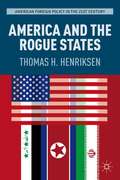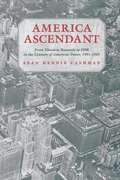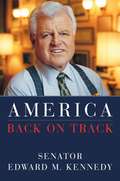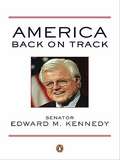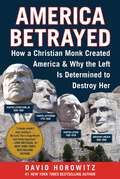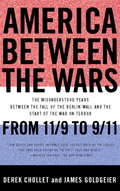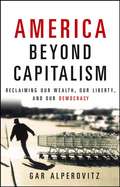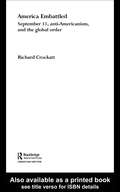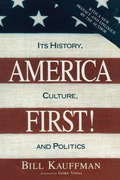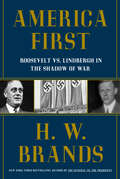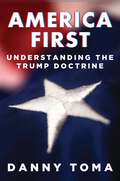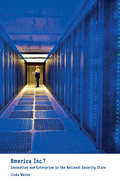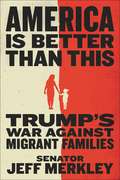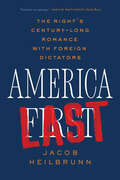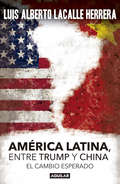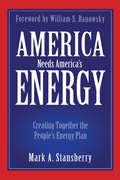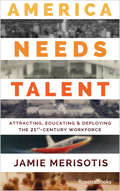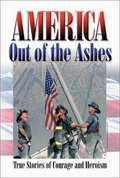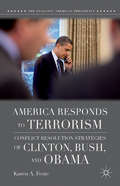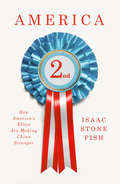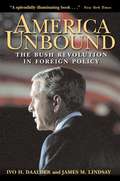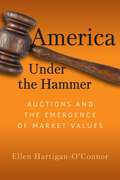- Table View
- List View
America And The Rogue States
by Thomas H. HenriksenAmerica and the Rogue States traces and examines the policies and interaction of the United States with the main adversarial nations in the post-Cold War era. The book concentrates on the three major rogue states-North Korea, Iran, and pre-invasion Iraq. What are termed as lesser rogue nations-Libya, Syria, Cuba, and the Sudan-receive summarized treatment in one chapter together with a brief discussion about why Afghanistan and Venezuela are not rogues. The author makes clear the distinctions among these confrontational regimes, noting that North Korea, Iran, and Saddam Hussein's Iraq aroused much more anxiety in Washington than lesser rogues and other troublesome states. After an opening chapter placing the rogue-nation phenomenon in historical and current context, the manuscript devotes one chapter each to the three major adversarial rogues. A final chapter deals with the less threatening rogue regimes. Each chapter follows a chronological format with description and analysis. The work is intended for a general reader interested in the topic; it also will have appeal as a supplemental text for university classes in international relations covering the period after the Cold War ended.
America Ascendant: From Theodore Roosevelt to FDR in the Century of American Power, 1901-1945
by Sean Dennis CashmanA lively tour of the United States in the first half of the twentieth century, America Ascendant traces the development of America's tremendous industrial power and its commercial deployment, at home and abroad. Emphasizing the contributions of those charismatic presidents who shaped the future of politics-- Theodore Roosevelt, Woodrow Wilson, and Franklin Delano Roosevelt--the book also covers pioneers such as Henry Ford and the Wright brothers, whose technological contributions transformed societies the world over. The book investigates the phenomena that threatened America's ascendance--the Great Red Scare of 1917- 20 and the rout of organized labor, the Great Crash of 1929 and the searing depression years, and the apartheid policies that undermined American democratic ideals. Moreover, Sean Dennis Cashman sets the American story within the dramatic context of the rise and fall of political empires in Europe and Asia and two devastating world wars. Enriching the volume is an integrated account of the American cultural scene, replete with such figures as Ernest Hemingway, Frank Lloyd Wright, George Gershwin, Louis Armstrong, Billie Holiday, Charlie Chaplin, and D. W. Griffith. Imaginatively conceived, America Ascendant once again reveals Sean Dennis Cashman's flair for bringing American history to life with all its triumphs, drama, and ambiguities.
America Back on Track
by Edward M. KennedyThe senator discusses challenges facing Americans, such as the economy, health care and the state of our democracy.
America Back on Track
by Senator Edward M. KennedyFrom one of America's most respected progressive voices comes an inspiring vision of reform and renewal In a Senate career spanning more than four decades, Edward M. Kennedy has become one of the most authoritative voices in American politics. His first major book in more than twenty years, America Back on Track argues that our nation has departed more deeply from its fundamental ideals than at any time in modern history. From a dangerous foreign policy to the threats against constitutional checks and balances, Kennedy tackles the country's gravest concerns and charts a course toward a stronger, freer, and fairer America. A provocative call to action, this will be read by everyone seeking political clarity in these tumultuous times.
America Betrayed: How a Christian Monk Created America & Why the Left Is Determined to Destroy Her
by David HorowitzAmerica is now engulfed in a crisis that goes to the very foundations of its democracy. To destroy Americans&’ pride in their heritage and undermine their will to defend it, the attacks on America&’s heritage begin with malicious slanders intended to turn the American dream of equality and freedom into a &“white supremacist&” nightmare. We are told America, from its inception, has been a &“racist&” nation that treats minorities as less than human. We are told America deserves to be destroyed. This destructive lie is now the official doctrine of the Biden White House, the &“woke&” Pentagon, the Democratic Senate, and the curricula of American schools. America Betrayed restores the true history of America&’s achievements and its role as a beacon of freedom. Framed by an account of Martin Luther&’s history and ideas, David Horowitz demonstrates that racial progress in America originates not from Leftist policy but from its founding ideals. America Betrayed is a history and a manifesto focused on the current war to save our country and restore the dignity and freedom of the individual.
America Between the Wars: From 11/9 to 9/11; The Misunderstood Years Between the Fall of the Berlin Wall and the Start of the
by James Chollet Derek GoldgeierOn November 9, 1989, the Berlin Wall collapsed, taking the Cold War down with it. The next twelve years passed in a haze of self-congratulation, Republican confusion, and angst, and economic prosperity?until they ended abruptly with a stunning catastrophe on September 11, 2001. "In America Between The Wars," Derek Chollet and James Goldgeier blend deep expertise with broad access to both partiesOCO political and policy establishments to find out how?and why?America failed to recognize that when we became the sole superpower with responsibility for the worldOCOs oversight, we overlooked how the new world actually worked.
America Beyond Capitalism: Reclaiming Our Wealth, Our Liberty, And Our Democracy
by Gar Alperovitz<p>This book argues that the only way for the United States to once again honor its great historic values--above all equality, liberty, and meaningful democracy--is to build forward to achieve what amounts to systemic change. <p>If the current political-economic system is no longer able to sustain equality, liberty, and meaningful democracy, what specifically do we want? And why, specifically, should anyone expect what we want to be any better than what we now have? And how, specifically, might what we propose deal with the everyday problems now facing most Americans? And finally, even if we can say what "system" would be better, why, specifically, do we think it might be attainable in the real world?
America Embattled: September 11, Anti-americanism, And The Global Order
by Richard CrockattWhat causes Anti- Americanism and where are its historical roots? What is the impact of 9/11 on America's sense of itself and its role in the world? Is America paradoxically a victim of its own political and economic power? This book seeks to understand the terrible attacks of September 11th within a broader historical, political and ideological context. Rather than drawing on simple 'clash of civilisation' oppositions, the author argues that it is important to have an awareness of the complex historical processes which influence: America's sense of itself and its changing view of the world How the world, especially the Muslim world, views America The changing nature of international politics and the global system since the end of the cold war. Drawing on a wide range of contemporary and historical sources Richard Crockatt has written a balanced, subtle and highly readable book which provides genuine insight into American foreign policy, anti-Americanism and Islamic fundamentalism. It will be important reading for all those seeking to understand the background to the 'war on terror'.
America Fascism and God
by Davidson LoehrReligion and politics have always been a potent mix. History is littered with times when that combination caused sweeping death and destruction, when it fueled aggression and oppression-and when it gave fascism a religious and diplomatic face. Reverend Davidson Loehr is afraid that we may be living in such a time in America today. On the Sunday following the election on November 2, 2004, Loehr, a liberal minister in Texas, delivered a sermon titled "Living Under Fascism"-a sermon that spread like wildfire through the Internet. "I mean to persuade you that the style of governing into which America has slid is most accurately described as fascism, and that the necessary implications of this fact are rightly regarded as terrifying," the preacher told his congregation. ". . . and even if I don't persuade you, I hope to raise the level of your thinking about who and where we are now. " In this series of incisive and inspired sermons, Loehr takes aim at the unholy alliance of corporate money, political power, and religious fundamentalism that is threatening both our political and our economic democracy. But Loehr's words provide little comfort to liberals and progressives who have stubbornly clung to a radical individualism and an amoral secularism. "America, Fascism, and God" is a call-first to understand that religion has been hijacked and debased. And then to take it back.
America First!: Its History, Culture, and Politics
by Gore Vidal Bill KauffmanThis lively, iconoclastic book, first published in 1995, but enduringly relevant, explores the rich heritage, the turbulent present, and the possible future of the political and cultural tendency known as "America First." With its isolationist stance against foreign wars and economic globalism, America First has helped to shape, if only in opposition, American policy both at home and abroad. Bill Kauffman, a columnist for The American Conservative, examines the nineteenth-century underpinnings and twentieth-century eruptions of American isolationism and nationalism, which are the fault lines along which the politics of the 21st century are cleaving. Kauffman recounts a fascinating story of "Little American" political culture, which was distinguished by its opposition to militarism, big government, and the concentration of wealth in the hands of the few, and by its promotion of the common man. The populist-isolationist song continues to be sung by many ordinary Americans who are far from the corridors of power yet who decry passionately, even desperately, what they consider reckless and destructive foreign wars and economic and immigration policies.In a new preface and epilogue written especially for this reissue, Kauffman traces the evolution of America First sentiment over the past twenty years: from its near-eclipse in the war hysteria of the George W. Bush administration to its revival in 2016 with the populist campaigns of Donald Trump and Senator Bernie Sanders.America First! is a rarity among political books: it remains more timely, relevant, and even urgent than ever.From the Trade Paperback edition.
America First: Roosevelt vs. Lindbergh in the Shadow of War
by H. W. BrandsBestselling historian and Pulitzer Prize finalist H. W. Brands narrates the fierce debate over America's role in the world in the runup to World War II through its two most important figures: President Franklin D. Roosevelt, who advocated intervention, and his isolationist nemesis, aviator and popular hero Charles Lindbergh.Hitler's invasion of Poland in September 1939 launched a momentous period of decision-making for the United States. With fascism rampant abroad, should America take responsibility for its defeat?For popular hero Charles Lindbergh, saying no to another world war only twenty years after the first was the obvious answer. Lindbergh had become famous and adored around the world after his historic first flight over the Atlantic in 1927. In the years since, he had emerged as a vocal critic of American involvement overseas, rallying Americans against foreign war as the leading spokesman the America First Committee. While Hitler advanced across Europe and threatened the British Isles, President Franklin Delano Roosevelt struggled to turn the tide of public opinion. With great effort, political shrewdness and outright deception—aided by secret British disinformation efforts in America—FDR readied the country for war. He pushed the US onto the world stage where it has stayed ever since.In this gripping narrative, H.W. Brands sheds light on a crucial tipping point in American history and depicts the making of a legendary president.
America First: Understanding the Trump Doctrine
by Danny TomaDonald Trump, Statesman? Critics dismissed the idea out of hand. Even his fans questioned whether President Trump could do what other presidents had considered impossible. But in less than two years, Trump has: - Put North Korea on the path to de-nuclearization and peace with South Korea. - Destroyed the "state" of the Islamic State. - Forged a de facto alliance between Saudi Arabia and Israel. - Doled out real punishment - not empty threats - for Syria's use of chemical weapons. -Re-negotiated international trade deals on terms more favorable to the United States. President Donald Trump's foreign policy successes have stunned not just his critics, but the world. Now Danny Toma, a State Department veteran, explains how Trump has done it, what the Trump Doctrine entails, and how it can- and likely will - continue to succeed. As Toma demonstrates, President Trump has restored American foreign policy to its traditional moorings, which anchored such "realist" presidents as George Washington, Dwight Eisenhower, and Ronald Reagan, who put American interests first, avoided unnecessary foreign entanglements, and pursued peace through strength. That foreign policy tradition made America great and, under President Trump's leadership, is making America great again. When America has strayed from those principles - especially as witnessed in the foreign policies of such "idealist" presidents as Jimmy Carter, Bill Clinton, George W. Bush, and Barak Obama - the results have been expensive in lives, treasure, and even international retreat. Provacative, thorough, and engagingly written, Danny Toma's America First is the one book you need to understand how America can again lead the world and protect her own interests.
America In The Time Of Abraham Lincoln: 1815 to 1869
by Sally Senzell IsaacsUses the life of Abraham Lincoln as a reference to examine the history of the United States from 1815 to 1869.
America Inc.?: Innovation and Enterprise in the National Security State
by Linda WeissFor more than half a century, the United States has led the world in developing major technologies that drive the modern economy and underpin its prosperity. In America, Inc., Linda Weiss attributes the U.S. capacity for transformative innovation to the strength of its national security state, a complex of agencies, programs, and hybrid arrangements that has developed around the institution of permanent defense preparedness and the pursuit of technological supremacy. She examines how that complex emerged and how it has evolved in response to changing geopolitical threats and domestic political constraints, from the Cold War period to the post-9/11 era.Weiss focuses on state-funded venture capital funds, new forms of technology procurement by defense and security-related agencies, and innovation in robotics, nanotechnology, and renewable energy since the 1980s. Weiss argues that the national security state has been the crucible for breakthrough innovations, a catalyst for entrepreneurship and the formation of new firms, and a collaborative network coordinator for private-sector initiatives. Her book appraises persistent myths about the military-commercial relationship at the core of the National Security State. Weiss also discusses the implications for understanding U.S. capitalism, the American state, and the future of American primacy as financialized corporations curtail investment in manufacturing and innovation.
America Invulnerable: The Quest for Absolute Security from 1812 to Star Wars
by James Chace Caleb CarrSurvey of our foreign policy through the 1980's.
America Is Better Than This: Trump's War Against Migrant Families
by Jeff MerkleyAn exposé and cry of outrage at the cruelty and chaos the Trump administration has wrought at the border with child separations, border blockades, and a massive gulag of child prisons housing thousands. p.p1 {margin: 0.0px 0.0px 0.0px 0.0px; font: 12.0px 'Times New Roman'} p.p2 {margin: 0.0px 0.0px 0.0px 0.0px; text-indent: 36.0px; font: 12.0px 'Times New Roman'} Jeff Merkley couldn't believe his eyes. He never dreamed the United States could treat vulnerable young families with such calculated brutality. Few had witnessed what Merkley discovered just by showing up at the border and demanding to see what was going on behind closed doors.Contrary to the official stories and soothing videos, he found mothers and children, newborn babies and infants, stranded for days on border bridges in blistering heat or locked up in ice-cold holding pens. There were nearly 1,500 boys jammed into a former Walmart, a child tent prison in the desert with almost 3,000 boys and girls, and children struggling to survive in gang-filled Mexican border towns after they were blocked from seeking asylum in the United States.Worst of all, there were the children ripped out of their parents' arms and sorted into cages in some profoundly warped attempt to discourage migration. This was how the Trump administration treated the child victims of unspeakable violence that had driven them from their homes: as pawns in a power play rather than as humans worthy of respect and dignity.It was Merkley's visits -- captured live on viral video -- that triggered worldwide outrage at the forced separation of children from their parents. Just by taking an interest -- by caring about the people legally claiming asylum at America's borders -- Merkley helped expose the Trump administration's war on migrant families. Along the way, he helped turn the tide against some of its worst excesses.AMERICA IS BETTER THAN THIS tells the inside story of how one senator, with no background as an immigration activist, became a leading advocate for reform of the brutal policies that have created a humanitarian crisis on the southern U.S. border. It represents the heartfelt and candid voice of a concerned American who believes his country stands for something far bigger and better.
America Last: The Right's Century-Long Romance with Foreign Dictators
by Jacob HeilbrunnA leading journalist and public intellectual explains the long, disturbing history behind the American Right’s embrace of foreign dictators, from Kaiser Wilhelm and Mussolini to Putin and Orban. Why do Donald Trump, Tucker Carlson, and much of the far Right so explicitly admire the murderous and incompetent Russian dictator Vladimir Putin? Why is Ron DeSantis drawing from Victor Orbán’s illiberal politics for his own policies as governor of Florida—a single American state that has more than twice the population of Orbán’s entire nation, Hungary? In America Last, Jacob Heilbrunn, a highly respected observer of the American Right, demonstrates that the infatuation of American conservatives with foreign dictators—though a striking and seemingly inexplicable fact of our current moment—is not a new phenomenon. It dates to the First World War, when some conservatives, enthralled with Kaiser Wilhelm II, openly rooted for him to defeat the forces of democracy. In the 1920s and 1930s, this affinity became even more pronounced as Hitler and Mussolini attracted a variety of American admirers. Throughout the Cold War, the Right evinced a fondness for autocrats such as Francisco Franco and Augusto Pinochet, while some conservatives wrote apologias for the Third Reich and for apartheid South Africa. The habit of mind is not really about foreign policy, however. As Heilbrunn argues, the Right is drawn to what it perceives as the impressive strength of foreign dictators, precisely because it sees them as models of how to fight against liberalism and progressivism domestically. America Last is a guide for the perplexed, identifying and tracing a persuasion—or what one might call the “illiberal imagination”—that has animated conservative politics for a century now. Since the 1940s, the Right has railed against communist fellow travelers in America. Heilbrunn finally corrects the record, showing that dictator worship is an unignorable tradition within modern American conservatism—and what it means for us today.
America Latina. Entre Trump y China: El cambio esperado
by Luis Alberto LacalleLa segunda entrega de la saga de Gabriel Keller, un asesino serial montevideano y gris. Otra magnífica novela negra de Hugo Burel. El Uruguay, junto con sus vecinos latinoamericanos, está siendo testigo de una particular e interesante coyuntura histórica: mientras asiste al derrumbamiento de los gobiernos populistas de izquierda, los vecinos del norte eligen un presidente polémico y altisonante, que propone estrategias de repliegue y foco en la producción interna.En este especial contexto, las fuerzas dormidas de China avanzan para expandir su influencia en América Latina, eligiendo al Uruguay como estratégica puerta de entrada. ¿Qué implicancias tendrá para nuestra región este avance? ¿Representa una oportunidad o una amenaza? ¿Qué actitud debería asumir el gobierno y la diplomacia al respecto? El Dr. Luis Alberto Lacalle, apelando a su amplia experiencia como gobernante y líder político, y haciendo gala de un agudo sentido analítico, reflexiona sobre las motivaciones de estos movimientos y aventura propuestas para el mejor futuro del país y la región.
America Needs America's Energy: Creating Together the People's Energy Plan (America Needs America's Energy Ser.)
by Mark A. StansberryAn oil & gas industry expert breaks down America’s energy situation and how Americans can get involved to help develop an energy plan.It’s time for an energy revolution! Gasoline prices have been rising, and oil supply disruptions are in question. This is old news, yet nothing has been done to change it. That is because it takes people like you stepping up and getting involved, and Mark A. Stansberry is here to show you how.In his latest book, America Needs America’s Energy, Stansberry offers a frank discussion of the issues at hand, as well as realistic, achievable solutions. America cannot move forward without your involvement and your commitment to develop an energy plan. Presented in direct, no-nonsense language and containing a glossary, sample forms, and other resources on things you need to know about America’s energy situation, America Needs America’s Energy is both a great go-to guide for learning about energy solutions and a wonderful launchpad for how to move forward together in creating the People’s Energy Plan.Praise for Mark A. Stansberry and America Needs America’s Energy“Through his many years of experience, Mark Stansberry successfully challenges us toward developing a comprehensive American energy plan.” —Bill Anoatubby, Governor, the Chickasaw Nation“As Mark states, “The time has come for all of us, the people, to take control of our energy future here in America.” He and I have discussed the importance of moving inevitably toward a hydrogen economy. I believe, after reviewing all the energy options presented in his book, it should move us closer to achieving that possibility. The future is now for us and our children. We cannot wait any longer.” —Woodrow W. Clark II, MA, PhD; Qualitative economist, Clark Strategic Partners; Corecipient of the Nobel Peace Prize“America’s energy policy cannot simply be cheap energy. Mark Stansberry tells us how to break out and assume an energy-secure and dynamic future economy.” —Frank Keating, Governor of Oklahoma, 1995-2003; President, American Bankers Association
America Needs Talent: Attracting, Educating & Deploying the 21st-Century Workforce
by Jamie MerisotisThe author of Human Work in the Age of Smart Machines presents &“a sharp, timely blueprint for unleashing the potential of millions of Americans&” (Bruce Kats, Founding Director oof the Brookings Metropolitan Policy Program).The president and CEO of Lumina Foundation, Jamie Merisotis is a leading voice in philanthropy, higher education, and public policy. In America Needs Talent, he explains the choices that must be made on all levels—in government, education, and the private sector, as well as by individuals—to usher in a new era of success and innovation in America. What if you paid for education based on what you actually learned, instead of the time you spent in class? What if visa applicants were treated like potential assets to our nation&’s talent pool, rather than potential threats monitored by Homeland Security? Merisotis proposes bold ideas to successfully deploy the world&’s most talented people, revitalize urban hubs, encourage private sector innovation, and power America&’s knowledge economy in the 21st century.
America Out of the Ashes
by The Editors at Honor BooksOn September 11, 2001, our nation experienced the horrific acts of terrorism through the tragic events in New York City, Washington D.C., and Pennsylvania. However, the devastating effects were not just confined to these areas as the entire world felt the impact of this attack on freedom and the loss of innocent lives. America Out of the Ashes depicts true stories of courage, hope, and inspiration accompanied by prayers to renew our souls and heal our hearts, to bring us from recovery to restoration. These inspiring stories of heroism and the prayers for god's comfort and provision reveal that with God's help America is rising up out the ashes, stronger and healthier than before.
America Responds to Terrorism: Conflict Resolution Strategies of Clinton, Bush, and Obama (The Evolving American Presidency)
by Karen A. FesteFeste develops a framework of terrorism termination dynamics constructed from empirical cases and applies it to the current al Qaeda problem to offer a new method for tracking development of terrorist episodes with implications for U. S. foreign policy.
America Second: How America's Elites Are Making China Stronger
by Isaac Stone FishA timely, provocative exposé of American political and business leadership&’s deep ties to China: a network of people who believe they are doing the right thing—at a profound and often hidden cost to U.S. interests.The past few years have seen relations between China and the United States shift, from enthusiastic economic partners, to wary frenemies, to open rivals. Americans have been slow to wake up to the challenges posed by the Chinese Communist Party. Why did this happen? And what can we do about it? In America Second, Isaac Stone Fish traces the evolution of the Party&’s influence in America. He shows how America&’s leaders initially welcomed China&’s entry into the U.S. economy, believing that trade and engagement would lead to a more democratic China. And he explains how—although this belief has proved misguided--many of our businesspeople and politicians have become too dependent on China to challenge it. America Second exposes a deep network of Beijing&’s influence in America, built quietly over the years through prominent figures like former secretaries of state Henry Kissinger and Madeleine Albright, Disney chairman Bob Iger, and members of the Bush family. And it shows how to fight that influence–without being paranoid, xenophobic, or racist. This is an authoritative and important story of corruption and good intentions gone wrong, with serious implications not only for the future of the United States, but for the world at large.
America Unbound: The Bush Revolution in Foreign Policy
by Ivo H. Daalder James M. LindsayAnalysis of George W. Bush's foreign policy, specifically from the start of his administration to mid 2003.
America Under the Hammer: Auctions and the Emergence of Market Values (Early American Studies)
by Ellen Hartigan-O'ConnorReveals how, through auctions, early Americans learned capitalismAs the first book-length study of auctions in early America, America Under the Hammer follows this ubiquitous but largely overlooked institution to reveal how, across the eighteenth and early nineteenth centuries, price became an accepted expression of value. From the earliest days of colonial conquest, auctions put Native land and human beings up for bidding alongside material goods, normalizing new economic practices that turned social relations into economic calculations and eventually became recognizable as nineteenth-century American capitalism.Starting in the eighteenth century, neighbors collectively turned speculative value into economic “facts” in the form of concrete prices for specific items, thereby establishing ideas about fair exchange in their communities. This consensus soon fractured: during the Revolutionary War, state governments auctioned loyalist property, weaponizing local group participation in pricing and distribution to punish political enemies. By the early nineteenth century, suspicion that auction outcomes were determined by manipulative auctioneers prompted politicians and satirists to police the boundaries of what counted as economic exchange and for whose benefit the economy operated. Women at auctions—as commodities, bidders, or beneficiaries—became a focal point for gendering economic value itself. By the 1830s, as abolitionists attacked the public sale of enslaved men, women, and children, auctions had enshrined a set of economic ideas—that any entity could be coded as property and priced through competition—that have become commonsense understandings all too seldom challenged.In contrast to histories focused on banks, currencies, or plantations, America Under the Hammer highlights an institution that integrated market, community, and household in ways that put gender, race, and social bonds at the center of ideas about economic worth. Women and men, enslaved and free, are active participants in this story rather than bystanders, and their labor, judgments, and bodies define the resulting contours of the American economy.
